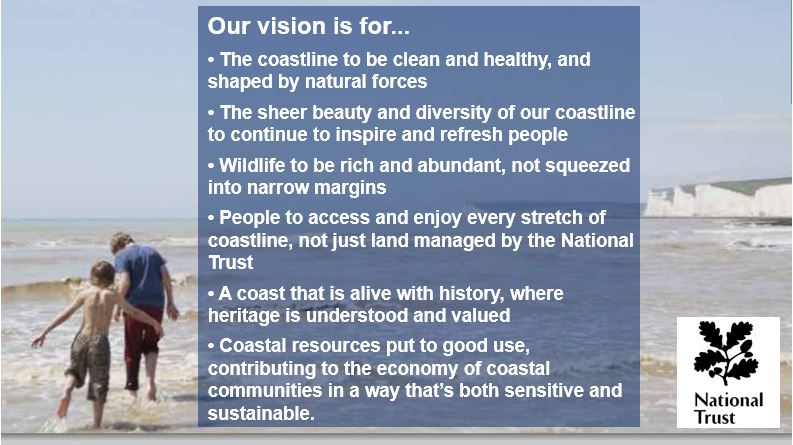The British coast is facing a disastrous future unless urgent action is taken now by the Government and agencies, the National Trust is warning. The country needs to prepare itself for the growing challenges of severe storms and rising sea levels.
According to National Trust research, over the past ten years 12,500 new homes and businesses have been built in areas along the coast that are at risk of significant flooding and/or erosion – this is despite a range of national guidance strongly advising that such developments must not be allowed to go ahead.
Alarmingly, the Trust informs that just one third of all coastal planning authorities in England have the latest planning policy in place to deal with increasingly more frequent storms and rising sea levels.
 Railway line damaged by the winter storms in early 2014 at Dawlish in Devon. (Image: National Trust report)
Railway line damaged by the winter storms in early 2014 at Dawlish in Devon. (Image: National Trust report)
Destruction caused by winter storms
The UK’s coastline was battered by a series of high tides and storms in 2013 and 2014 which resulted in erosion levels that would normally take up to fifteen years to occur, say flooding experts.
In the years to come, extreme weather events will probably occur more frequently, affecting both humans and natural habitats, and putting coastal wildlife at risk.
The Met Office has warned the UK is facing 3 months of severe storms and flooding, following November’s unusually mild weather. Temperatures will drop to -14 °C (6.8 °F) early next year.
National Trust approach
In its new report – “Shifting Shores – playing our part at the coast” – the National Trust is calling for an imaginative and bold approach to coastline management, which takes into account how nature works, moving towards adaptation and away from propping up and maintaining engineered defences where appropriate. The approach must also be sensitive to the needs of the community.
The Trust plans to implement this approach and commits to have plans in place for at least eighty of the country’s coastal areas by 2020.
National Trust coastal marine adviser, Phil Dyke, said:
“We know how difficult taking the adaptive approach can be, despite all the good policy guidance that now exists. But action is now needed by all coastal stakeholders to manage the threats to our beautiful and diverse coast to prevent us drifting into a future where our coast is a rim of concrete.”
 Photograph and text taken from the new National Trust report.
Photograph and text taken from the new National Trust report.
Dealing with coastal change
Where coastlines and surrounding areas are at risk, the Trust also wants to make sure there is space and land to help with a managed realignment – relocating and rolling back buildings, infrastructure, habitats and the shoreline.
Large areas of the coast need to viewed as a whole, in order to create more joined up and better managed stretches of coastline.
On its website, the National Trust writes:
“We want to work in partnership with a wide range of local landowners, communities and groups to deliver a joined up approach to managing coastal change, which works for all the parties involved.”
Peter Nixon, director of land, landscape and nature, said:
“The harsh truth is that our natural environment is in poor health – wildlife is in decline, over-worked soils are being washed out to sea and climate change is becoming an increasing threat.”
“The complex and ever-changing challenges we face on the coastline can only be addressed by working in partnership with others. We can’t and won’t ever succeed on our own.”
“Above all we need to understand the forces of nature at work, so that we can all make well-informed choices about whether and where to continue maintaining hard defences or to adapt to and work with natural processes.”
National Trust Video – East of England coast campaign
This year marks the 50th anniversary of the National Trust’s coastline campaign. This video talks about the 117 mile stretch of coastline, what’s special about it, and why the Trust needs your help to protect it. Such campaigns exist across the country.

